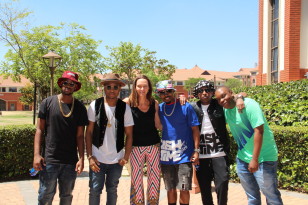 When I first heard the current hit South African song “Caracara” I knew I wanted to meet this crew. If there’s a winning recipe for feeling good, at least for 3:52 seconds, “Caracara” is it. The lazy, urban tempo, the sexy flow, and simple catchy hook is infectious.
When I first heard the current hit South African song “Caracara” I knew I wanted to meet this crew. If there’s a winning recipe for feeling good, at least for 3:52 seconds, “Caracara” is it. The lazy, urban tempo, the sexy flow, and simple catchy hook is infectious.
One listen drove me straight to Youtube searching for the video. Ishkanda artist K.O and his crew, Cashtime Tsosti for Life, did not disappoint. “Caracara” is the local name for the Volkswagen minibus theme in the video and symbolic of good ghetto party time with beautiful women.
I went to Johannesburg and met up with the K.O, Kid X and the rest of the crew on October 2nd and we’ll meet them in a moment. But first, check out the video now if you haven’t seen it yet.
Caracara was shot in Soweto, the nation’s largest black urban township in Johannesburg and famously trendsetting place for politics, fashion, language, and music and dance.
So when I arrived in Johannesburg I’d already made arrangements with CashtimeLife’s CEO, Thabiso Khati, to meet with the whole crew.
We arrived thirty minutes late, due to an over-casual local fixer, but the crew were courteously waiting for me in a conference room of a high-end business campus; So much for the stereotype
of the irresponsible and undisciplined musician. After brief introductions and an awkward gift-giving moment (when I presented them VOA tee- shirts that didn’t exactly excite their dust-and-sheen stylistic sensibilities) we went outside for a quick photo/video shoot.
We settled by the pond and here in order of appearance I present DJ Vigilante, Ma-E aka Easy Does It, Kid X, Maggz, K.O aka Mr. Cashtime.
The CEO of CashtimeLife Thabiso Khati runs the company of artists as individual business units. Each artist, including one female who unfortunately could not make today’s interview, approaches his and her own art as a business. Thabiso encourages them to take ownership of their own units and equips them with their own team of booking managers, marketers, and marketing strategists to bring out the best the unique talents of each artist.
 CashtimeLife is only one year old, but two of its core members, MaE and KO, came over from an older crew called Cashtime Entertainment that has won several awards including a nomination for Best Group at the 2010 MTV Africa Awards. They are young but not newcomers. Furthermore, says Khati, most of the members have university degrees so he feels like they can’t go wrong. They don’t think that it’s cool to drop out of school. Instead, they are banking on their education to be the tool that turns their music into money. “We’ve got to monetize and capitalize,” says Khati. “We understand where the world is going so we’re playing in technology. We’ve launched our own digital platform where you can buy music. We actually aggregate content for other labels as well…We have merchandise…”
CashtimeLife is only one year old, but two of its core members, MaE and KO, came over from an older crew called Cashtime Entertainment that has won several awards including a nomination for Best Group at the 2010 MTV Africa Awards. They are young but not newcomers. Furthermore, says Khati, most of the members have university degrees so he feels like they can’t go wrong. They don’t think that it’s cool to drop out of school. Instead, they are banking on their education to be the tool that turns their music into money. “We’ve got to monetize and capitalize,” says Khati. “We understand where the world is going so we’re playing in technology. We’ve launched our own digital platform where you can buy music. We actually aggregate content for other labels as well…We have merchandise…” 
Khati considers the longevity of an artist’s career. “It’s cool to be an artist but there comes a time when you just want to do one or two shows a year. You don’t want to be out on the road. Maybe guys settle, they’ve got families. But you also want to make sure that they settle into a day job that’s still within what they love and that they have ownership of that… the only pension is to create opportunities for guys to keep earning when they stop making music.
One big question I had for Khati was about the style of Hip Hop they call Skhanda. He defined it very nicely. “You take dust, you take sheen, you put them together and that’s bling.” Khati continued to explain Skhanda in historical context. “South Africa is split in two. The sections that aspire to be first world and you got third-world elements which are in the majority.
“We come from the third world elements. We come from the townships.”
He goes on to explain that growing up in the townships, they would acquire hand-me-downs and make the best of them by turning them into creative styles. But since 1994, more and more young people are growing up in an expanding suburban, black middle class who are Hip Hop’s number one consumers. They live in what we call the sheen. We come from the dust. So now, we take certain elements from where we come from… you see guys in Jordans, in gold chains…” I interrupted him to get one of the crew to demonstrate:
Skhanda is not only a style of dress that has changed the way kids dress, and music (of course) but it’s also a style of talk. It surprised Thabiso Khati recently to see that the kind of slang which CashtimeLife created amongst themselves as a crew is now everywhere on Twitter. For Khati and the crew, however, Skhanda is their opportunity to monetize and capitalize. He mentions their tee-shirt line, sock line and a new merchandising deal in the works. “It’s beyond music,” he says, “It’s how you take music and apply it to everyday life.”
We wrap up the interview with Khati repeating a point he’d brought up earlier about the importance of education. “Nelson Mandela said it best: The only way to come out of poverty is via education.
“We gotta teach that and preach that and show that education is not square.” Khati emphasizes that they come from the townships. He is from Meadowlands, in particular, and is a scholarship kid, so they are all cases-in-point that anyone can be whatever they want to be regardless of where they come from.
As for what’s next for CashtimeLife, Khati says “Music awards are great and nice, but it’s not what we work for. For me, the guys, and the whole crew, It’s being able to push the culture forward. Being able to do what’s never expected. And while doing that, the centerpiece is great music.”



One response to “The Dust and Sheen of South African Hip Hop”
[…] when I arrived in Johannesburg I’d already made arrangements with CashtimeLife’s CEO, Thabiso Khati, to meet with the whole crew. We arrived thirty minutes late, due to an over-casual local fixer, […]